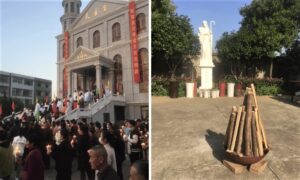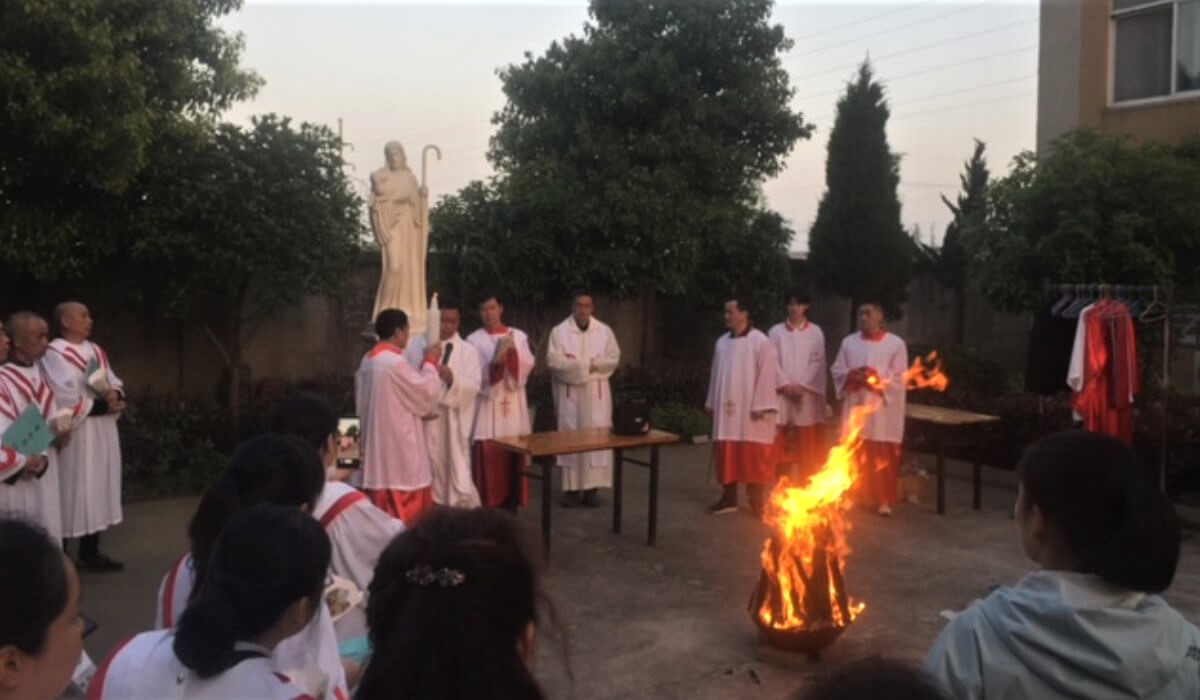By mid-afternoon on Holy Saturday, there was already a steady hum of activity at Holy Trinity Church in Xiantao, about 100 km west of Wuhan, writes Columban missionary Fr Dan Troy.
Food was being prepared for those who had travelled long distances two days earlier and had already stayed for two nights in the pastoral centre.
One group of Catholics was nearing the completion of the flower arranging in the church. Lines of people were patiently awaiting their turns at the church’s newly constructed confession boxes. A neatly dressed Catholic who had already stayed two nights at the pastoral centre was making his skills available for free, standing by a stool in the yard and giving haircuts to anyone who was in need of a seasonal trim.
As the time for the beginning of the Easter Vigil drew near, large bowls of freshly cooked food were placed on two tables outside the church for about 70 people, the requirement to stand while eating making it easier for the parish to take care of the logistics.
Over the next hour, more parishioners gathered. Many arrived on electric bikes or on foot, a reminder that life in this part of China is lived in a way that is quite different to the big cities that are often used to portray the modern face of China to the wider world.
A few minutes before the Easter Vigil began, a blazing fire was already announcing that liturgical symbolism is well understood in this parish, the leaping flames and the heat of the fire immediately becoming a focus of attention.
As the ceremony began, Fr Paul Zhang led the people through the preparation of the paschal candle, the time-honoured tradition that announces God’s fidelity from the beginning of time to the end of time.
As the paschal candle was lit, the light of Christ was proclaimed in song, the new hope that breaks into history with the resurrection of Jesus. In procession, the community of believers gradually made its way to the church, the procession of light speaking deeply about how the Risen Christ was already finding a place in the hearts of people who face as many daily challenges as people in any other part of the world.
In a church filled to capacity, the community listened to seven readings in preparation for the eventual singing of the Alleluia verse, another step deeper into the Easter celebration. Following a lengthy homily, six adults and two children came forward for baptism, an occasion of joy for the community.
 The Catholics in this administrative centre of Hanyang Diocese celebrated the opening of their new church just ten years ago. The gradual growth of the community each Easter echoes the deeper meaning of the Good News being shared with people through every age of history.
The Catholics in this administrative centre of Hanyang Diocese celebrated the opening of their new church just ten years ago. The gradual growth of the community each Easter echoes the deeper meaning of the Good News being shared with people through every age of history.
Three hours after the paschal candle had been lit, the community was told to go forth at the end of Mass to share the news of the resurrection of Jesus. As people moved out of the church on the star-lit night, a few volunteers distributed boiled eggs wrapped in an Easter message, some parishioners seeking to find out the origin of the tradition.
This celebration of Easter took place in a setting where the community’s connection with the universal Church is deeply treasured. However, for this community and for so many other communities of faith throughout China, there is deep unease at the recent installation of Bishop Joseph Shen Bin as the new Bishop of Shanghai because it took place without Vatican approval.
This means that the Chinese civil authorities have broken the agreed processes that were signed up to by China and the Vatican in 2018, a temporary agreement that has been renewed every two years.
The transfer of Bishop Joseph Shen Bin from his role in the Diocese of Haimen to the nearby Diocese of Shanghai is a serious issue. As happened in a similar development in Jiangxi province last October, the Vatican is likely to address the Shanghai case with a statement seeking clarifications, each phrase of the communication to be carefully crafted so as ask questions and yet painstakingly seek to keep the doors of dialogue open with a government that it has not yet established diplomatic relations.
There is a gulf of difference between both sides as they find themselves once again in a situation where an agreement has been transgressed. Some people speculate that regional powers might be using the occasion to show others that they have their own level of autonomy, irrespective of what area of life is involved.
As mentioned to me by a Chinese priest a few years ago as he reflected on the slow progress in such areas, it was suggested that patience is needed and that the calming of diplomatic waters would likely take three generations.
Such a timescale seems like an eternity for many people but perhaps the Vatican and the Chinese are accustomed to such demands of time, especially if some progress can be observed when looking back over history.
A mere fifty years ago it was not possible for any faith community in China to celebrate openly. As this year’s Easter celebrations in Xiantao and celebrations in a multitude of other places in China remind us, there has been huge progress for the Church in China in recent history.
While much still needs to happen and many challenges are still faced on a daily basis, communities of faith in China are celebrating in a public way that Christ has risen and they are sharing this great news with others.
Columban Fr Dan Troy lives and works in Wuhan, China.
Courtesy: Independent Catholic News – https://www.indcatholicnews.com/

